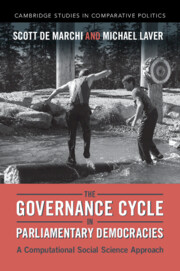Book contents
- The Governance Cycle in Parliamentary Democracies
- Cambridge Studies in Comparative Politics
- The Governance Cycle in Parliamentary Democracies
- Copyright page
- Contents
- Figures
- Tables
- Acknowledgments
- Introduction
- 1 Governance, Complexity, Computation, and Rationality
- 2 The Governance Cycle
- 3 An Agent-Based Model of Government Formation and Survival
- 4 Artificial Intelligence and Government Formation
- 5 Analyzing Models of Government Formation and Survival
- 6 Empirical Analyses of Government Formation and Stability
- 7 Conclusions and Aspirations
- Book part
- References
- Index
- Cambridge Studies in Comparative Politics
1 - Governance, Complexity, Computation, and Rationality
Published online by Cambridge University Press: 02 February 2023
- The Governance Cycle in Parliamentary Democracies
- Cambridge Studies in Comparative Politics
- The Governance Cycle in Parliamentary Democracies
- Copyright page
- Contents
- Figures
- Tables
- Acknowledgments
- Introduction
- 1 Governance, Complexity, Computation, and Rationality
- 2 The Governance Cycle
- 3 An Agent-Based Model of Government Formation and Survival
- 4 Artificial Intelligence and Government Formation
- 5 Analyzing Models of Government Formation and Survival
- 6 Empirical Analyses of Government Formation and Stability
- 7 Conclusions and Aspirations
- Book part
- References
- Index
- Cambridge Studies in Comparative Politics
Summary
We outline the core argument of the book and steps taken to establish this. We begin by sketching component parts of the governance cycle: election, government formation, and government survival. Noting that the analysis of this complex system is intractable for traditions deductive methods of formal modeling, we preview two different computational methods for analyzing it. First, we model “functionally rational” artificial agents who use simple but effective rules of thumbs to navigate their high stakes but complex environment (ABM). Second, we specify an artificial intelligence (AI) algorithm which, by massively repeated self-play, teaches itself to find near-optimal strategies for playing what is in effect a traditional, but intractable, noncooperative game. We conclude by sketching the empirical approach we use to first calibrate and exercise the models on training data and then test them on out-of-sample test data.
Keywords
- Type
- Chapter
- Information
- The Governance Cycle in Parliamentary DemocraciesA Computational Social Science Approach, pp. 9 - 35Publisher: Cambridge University PressPrint publication year: 2023



